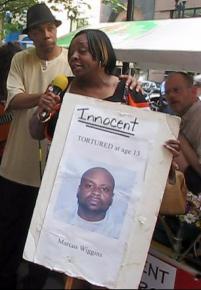Why can’t torture victims get justice?
was a victim of police torture at age 16 and spent 28 years in prison for a crime he did not commit. Now a board member of the Campaign to End the Death Penalty, he explains why he continues to fight for justice for other torture victims.
NEARLY A million people lined up between 39th Street and 55th Street along Martin Luther King Drive in Chicago to watch the annual Bud Billiken Day parade. As usual, political figures such as Rev. Jesse Jackson participated in the parade. One of the officeholders was Illinois Attorney General Lisa Madigan, who appeared, waving from the stage of a float.
I was there to ask her why victims of Chicago Police have not been able to win justice.
Former police Commander Jon Burge and his subordinates tortured Black and Latino suspects at Area Two and Three violent crimes for two decades, starting in the early 1970s. More than 200 men were physically and psychologically abused with tactics such as electroshock to their genitals, suffocation with plastic typewriter covers, Russian Roulette, beatings with telephone books, waterboarding, hanging suspects out of police station windows and sticking theirs heads in toilets.
Many of these men falsely confessed to whatever crime the cops wanted them to admit to, and more than a dozen are still in prison, but have never had a hearing on their claims that their rights were violated.

Madigan has the legal jurisdiction to grant these men hearings. Before she was elected attorney general in 2002, she promised to finally bring justice for these men and end their plight by giving them a chance to tell their story. But once in office, she went back on her promise, claiming that each case was different and would be handled differently.
IN 2006, a special prosecutor's report admitted that Burge and his men committed torture to elicit confessions. Cook County State's Attorney Anita Alvarez agreed that the Burge torture victims had been treated wrongly and promised to conduct investigations and free those who had been put in prison wrongfully. But Alvarez has also not remedied these cases.
Meanwhile, the county and the city of Chicago continue to shell out millions of taxpayer dollars to settle cases of abuse involving Burge. Just last month, the city reached an agreement in two cases of wrongful conviction and torture, paying more then $7 million dollars.
Burge was convicted in federal court for lying about torture and sits inside a North Carolina prison today, but he is collecting his full pension--while his victims continue to suffer inside Illinois prisons, facing inhumane treatment by prison officials. I am someone who suffered not only from the Burge torture ring, but from the abuse of prison guards, prison conditions and policies. The city has provided no psychological help for men who spent decades behind prison walls for crimes they never committed.
At this point, the charges of torture have been proven credible enough for the department to fire Burge in 1993, and to convict him of perjury in federal court. But his victims have not all gotten hearings. Some of the detectives who worked under Burge remain on the job with the Chicago police, and they have been accused of additional cases of abuse and torture. But Madigan and her office remain silent about the victims as their cases drag on for years in the Cook County court system.


